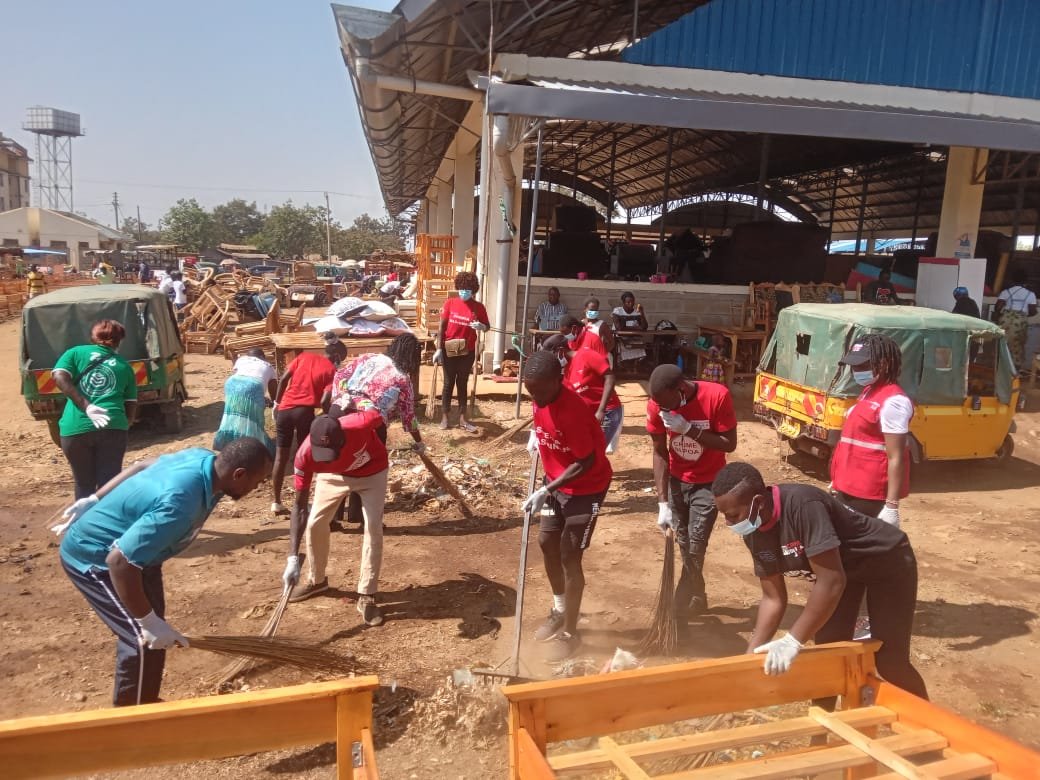Locally Led Solution to Waste Pollution
By David Oduor, Lavender Omondi
In the outskirts of Kisumu City, specifically in Obunga slums where waste disposal has long been a pressing issue and illegal dumping is a daily occurrence, we introduce you to a community-based organization known as Kamakowa JamTaka. This organization is driven by the youth whose primary mission is to create a clean, safe, and healthy environment.
Kamakowa JamTaka community based orga nisation (CBO) is a youth-led community-based organization located in Kamakowa village, one of the five units within Obunga slums. Established in 2019 under the leadership of Mr. Isiah Odhiambo, the group’s director, it currently comprises 28 members, consisting of 22 males and 6 females. The group has experienced remarkable growth, attracting numerous young individuals.
Given its location within a financially challenged urban setting, where most residents have limited income and face difficulties managing their waste, the organization primarily focuses on waste collection. They provide an affordable waste collection service, charging a modest fee of 30 shillings per household per collection. During their weekly waste collection rounds, they engage in waste segregation right at the household level. This involves sorting plastics, metals, glass bottles, boxes, organic waste, and more. The collected waste by-products, particularly plastic, which is in abundance, are stored and subsequently sold, generating income for both the group and its members. The glass bottles are creatively repurposed into glass tumblers and candle holders, adding to the group's financial sustainability. However, Kamakowa Jamtaka doesn't handle all types of waste as they are unsure of what to do with items like clothing, PVC pipes, plastic bags, and even diaper waste.
Kamakowa JamTaka CBO's efforts don't stop at waste collection alone. They harness organic waste to produce organic manure through composting. This valuable manure is used for urban farming and in creating demonstration farms using cones and recycled plastic. These initiatives not only help the community members but also contribute to addressing food security.
In addition to waste collection and recycling, the group actively participates in community clean-up campaigns, often collaborating with community members and various stakeholders, including the county government and waste champions. These clean-up drives are designed to maintain a clean and safe environment, free from plastic pollution. Moreover, they are strong advocates for a clean environment and create awareness through community meetings (barazas) and social media platforms. One of the most disheartening challenges they face is that, even after conducting house-to-house waste collections, some individuals continue to dispose of waste in areas that have been cleaned. The community's failure to appreciate their hard work demoralizes the group.
Members of Kamakowa JamTaka CBO during a community clean up
Photo Credit: Abraham Baraka, KYCTV
As they continue their dedicated efforts to manage waste, Kamakowa JamTaka CBO faces various challenges, including stigmatization, as many people perceive waste collection as a low-status job. However, through training and capacity building, the members have managed to overcome this stigma by understanding their crucial role in effecting change.
Another significant challenge they confront is the transportation of waste from the temporary dumping site to Kasese, the county dumping site, due to its considerable distance. Delays by county trucks, sometimes stretching to two months, cause sanitation issues in the area, leading to concerns from local residents. Financial constraints also hinder the full implementation of their activities, given the limited scope of their initiatives. Furthermore, some members exhibit reluctance to actively participate in group activities.
Kamakowa JamTaka CBO collaborates with the county government of Kisumu and Crime Si Poa to plant trees in Kudho Primary School and aims to expand tree planting initiatives in more schools. This partnership with schools is strategic, as it ensures that the trees are cared for and nurtured by the students.
In their day-to-day endeavors, the group has gained recognition from the county government of Kisumu and the City Department of Environment. This recognition has fostered a strong working relationship and led to referrals to other stakeholders and organizations. Partnering with NGOs such as Muungano Wa Wanavijiji – SDI Kenya, VSO, SUSWATCH, SELF HELP, KIWAPWA, among others. The group has received diverse training, ranging from group formation to financial literacy which have been impactful to the group.
Notably, the group was among the 16 Muungano groups in Kisumu that had the privilege of receiving the Voices for Just Climate action support grant for up-scaling climate solutions at the grassroot level. It was initiated by Muungano Wa Wanavijiji – SDI Kenya. This grant enabled them to acquire a plastic shredding machine, which will significantly enhance their plastic collection efforts, creating more job opportunities for group members and aiding in the fight against plastic pollution.
In their quest for a clean and healthy environment, Kamakowa JamTaka CBO firmly believes in the community's shared responsibility. They call upon all community members and stakeholders to actively engage in the effort to clean and preserve the environment. As they rightly put it, "No one has the right to sit down and feel hopeless. There is too much work to do for the environment."
In the next few years, Kamakowa hopes to expand nationwide, moving beyond its community-based focus. They aspire to gain recognition from the National government and are confident that their community efforts will positively impact and change lives. They also hope for effective sensitization across a broader segment of the community to encourage collective action in practicing climate change. "Together with the entire organization, we yearn for an established just climate and campaign for the 'Let's go green' slogan in regard to protecting our land and its environs," David Omollo says.

